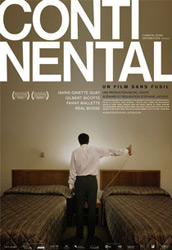Les Prix Jutra 2008
by Maurie Alioff
(March 10, 2008 – Montréal, QC) “Any journalists in the room?” asked Normand Brathwaite, the TV comedian who hosted the 2008 Prix Jutra ceremony. “Get out. Denys Arcand is waiting for you.” Braithwaite’s reference to Arcand’s banning of media types from his master class at the recent Rendez-Vous du Cinéma Québécois set a tone for the evening. The 10th Soirée des Jutras might have been the world`’s first post-modern award show. There were serious and sentimental moments, but overall, the entire shindig was peppered with cross-referential wisecracks and an irreverent attitude toward Québec moviemaking, which the Jutras were designed to honour and promote.
 For instance, Patrick Huard, reportedly irritated that he did not get a best director nomination, even though his film Les 3 p’tits cochons received nods in almost every other category, presented the director’s Jutra. The gesture seemed even more ironic when it became clear that Les 3 p’tits cochons would pick up only one trophy: the pre-announced Billet d’or, which goes to the most profitable movie of the year.
For instance, Patrick Huard, reportedly irritated that he did not get a best director nomination, even though his film Les 3 p’tits cochons received nods in almost every other category, presented the director’s Jutra. The gesture seemed even more ironic when it became clear that Les 3 p’tits cochons would pick up only one trophy: the pre-announced Billet d’or, which goes to the most profitable movie of the year.
In an unusual move that deflated the earnestness of award shows, the nominated films included a production no one had ever heard of. Ostensibly created by and starring Normand Brathwaite, the ponderously entitled Brume de nuits (Fog of Night) vied for Jutras in various slots, its over the top clips spoofing the excesses of Québec cinema.
Each overwrought scene, not to mention the ridiculous theme song, build to someone`s sombre intonation of the words, “Brume … brume de nuit.” The gag climaxed when the renowned veteran Louise Marleau, who has never won a Jutra, took the best actress prize for her role in the non-existent movie. Naturally, her acceptance speech was an inventory of acceptance speech clichés, and the real winner (Guylaine Tremblay for her heart-breaking performance in Bernard Émond’s Contre toute espérance) eventually got her Jutra.
 Also in the performing category, Roy Dupuis picked up the best actor Jutra for his typically rock solid interpretation of Lt.-General Roméo Dallaire in Roger Spottiswoode’s Shake Hands with the Devil. Wearing a black leather jacket and black jeans, Dupuis spoke to reporters in the media room about his deep admiration for Dallaire, who attended the Soirée. “He’s a man of great courage, a courage that comes from knowledge of humanity. That’s an essential quality: to rapidly understand the weaknesses and strengths of each individual, to avoid sending people where they can’t be effective and their lives are at risk.” For Dupuis, Dallaire is blessed with “a great humanity in the sense of openness to others and respect for others who sometimes seem different from us.” The actor dislikes the word “tolerance”; people should see the “beauty in diversity, more than just tolerating it.”
Also in the performing category, Roy Dupuis picked up the best actor Jutra for his typically rock solid interpretation of Lt.-General Roméo Dallaire in Roger Spottiswoode’s Shake Hands with the Devil. Wearing a black leather jacket and black jeans, Dupuis spoke to reporters in the media room about his deep admiration for Dallaire, who attended the Soirée. “He’s a man of great courage, a courage that comes from knowledge of humanity. That’s an essential quality: to rapidly understand the weaknesses and strengths of each individual, to avoid sending people where they can’t be effective and their lives are at risk.” For Dupuis, Dallaire is blessed with “a great humanity in the sense of openness to others and respect for others who sometimes seem different from us.” The actor dislikes the word “tolerance”; people should see the “beauty in diversity, more than just tolerating it.”
Broadcast live from Studio 42 in Radio-Canada, the Soirée des Jutras unfolded on a black and white set, the nominees and other industry types seated in sleek couch and table modules suggesting a trendy resto-bar. Québec Culture and Communications Minister Christine St-Pierre showed up for the gala, unlike Heritage Minister Josée Verner who passed, possibly to avoid the embarrassment experienced by her predecessor, Bev Oda, at last year’s Jutras. While Oda suffered faulting for her penny-pinching, Verner would have been severely chastised for her defense of Bill C-10, the Conservative government`s attempt to eliminate what it deems objectionable film and TV content.
 Also missing in action were Denys Arcand and his producer/wife Denys Robert. Arcand’s L’âge des tenebres, which had been nominated in key categories, including best director, took the evening’s top snub, winning only the makeup prize that went to Diane Simard.
Also missing in action were Denys Arcand and his producer/wife Denys Robert. Arcand’s L’âge des tenebres, which had been nominated in key categories, including best director, took the evening’s top snub, winning only the makeup prize that went to Diane Simard.
Inevitably, Stephane Lafleur’s widely admired Continental, un film sans fusil won four major Jutras, the latest confirmation of the picture’s status as 2007’s success d’estime, a reputation that has been building since last year’s Venice Film Festival. Flush with Continental’s wins for best picture, director, screenplay, and supporting actor (Réal Bossé as a socially and sexually repressed salesman), Lafleur told journalists that the awards were “the icing on the cake, which is already very big.” He`s enjoyed the freedom he had while writing and directing his first feature, the results he achieved, and his eager team of youthful collaborators.
As for Continental’s weak box-office, the 31-year old Lafleur said that audiences might have been turned off by the media focus on his depiction of solitude. “The film is so much more than that,” he continued, adding that Continental is a film that demands the shared experience of a theatre. “It’s a strange kind of humour, a deadpan humour,” he told Northernstars. “Sometimes you laugh at things, and you don’t really know why you’re laughing. Being with other people gives you the right to laugh.”
Lafleur, as well as producers Kim McGraw and Luc Déry, are hoping that the big win will arouse more audience interest in their alienation comedy. Perhaps a limited re-release would be a good idea. Everyone agrees that the Jutras solidify the reputation of McGraw’s and Déry’s company, micro_scope, winner of five 2007 Jutras, including best picture, with the dramedy, Congorama. Increasingly, the prodco is being compared to Toronto’s Rhombus Media, the company behind Silk, a theatrical disappointment, but the winner of four Jutras including one for Alain Dostie`s lyrical cinematography.
Another lyricist, director-cinematographer-editor Jean-Claude Labrecque received 2008’s Prix Jutra-hommage, which honours contributions made by veteran filmmakers. As far back as his award-winning 1965 short 60 Cycles, which experimented radically with telephoto lenses, and 1977’s les Jeux de la XXie Olympiade, Labrecque has directed, filmed, or cut many classic docs and fiction features. A peripatetic 70-year-old, who recently shot Contre toute espérance, Labrecque told the audience that he has many good projects and will “be back.” Indeed, he will be when his upcoming Infiniment Québec gets released in the spring.
Although the Soirée des Jutras was a tight, slickly produced and innovative awards show, it did not score big with TV viewers, drawing an average of 655,000 during the March 9 telecast on Radio-Canada. The preceding Radio-Canada show had better ratings, and the heaviest competition, TVA’s Le Banquier (the local version of Deal or No Deal) attracted an average of 2,217,000 viewers during an overlapping time period.
First the Oscars and now the Jutras have seen a drop in viewership. What’s up?
![]() Maurie Alioff is a film journalist, critic, screenwriter and media columnist. He has written for radio and television and taught screenwriting at Montreal’s Vanier College. A former editor for Cinema Canada and Take One, as well as other magazines, he is affiliated with the Quebec media industry publication, CTVM.Info. His articles have appeared in various publications, including Canadian Cinematographer, POV Magazine, and The New York Times. He is the Québec Correspondent for northernstars.ca.
Maurie Alioff is a film journalist, critic, screenwriter and media columnist. He has written for radio and television and taught screenwriting at Montreal’s Vanier College. A former editor for Cinema Canada and Take One, as well as other magazines, he is affiliated with the Quebec media industry publication, CTVM.Info. His articles have appeared in various publications, including Canadian Cinematographer, POV Magazine, and The New York Times. He is the Québec Correspondent for northernstars.ca.


